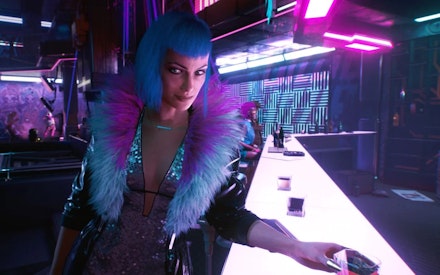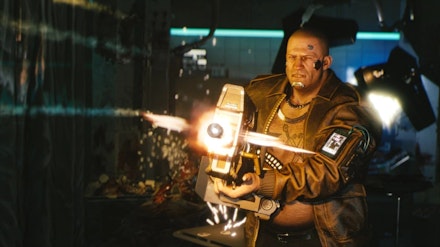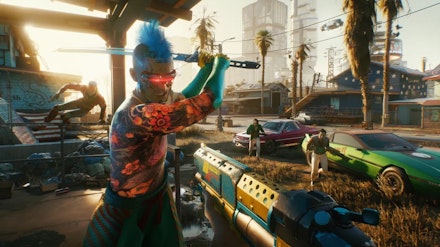Platforms: PlayStation, Xbox, PC
Few games have launched with as heavy a weight of expectation on them as Cyberpunk 2077{:rel=nofollow}– almost a decade in the making and coming in the wake of developer CD Projekt Red's brilliant The Witcher III, it has an almost unimaginable level of hype surrounding it. It's also impossible for anything to live up to that much anticipation, so while we'll say up front that it's brilliant, it's also burdened by flaws. Do not expect perfection.
Give the years of buzz for the game, chances are you're already up to speed on the background – you play as V, a runner on the mean streets of the sprawling, neon metropolis of Night City. You determine exactly who V is though, both physically – with a fantastically detailed character creation tool that allows you to blur even the extremes of sex and gender – and in terms of background. Three distinct "life paths" – isolated Nomad, gritty Street Kid, or high-flying Corpo – give wildly different intros to the game, and determine how other characters respond to your version of V throughout the game.

Like almost everyone in this dystopian future, V is enhanced with a series of cybernetic implants, which is where Cyberpunk really nestles down into its RPG roots. Everything from eyes and hands to the nervous and integumentary systems can be modified by visiting a "ripperdoc", and how you choose to technologically augment V's body factors greatly into your play style. Want to go into situations heavy, soaking up as much damage as you dish out? Some sub-dermal armour and a host of upgrades to boost weapons targeting and melee damage should do the trick. Prefer a stealthy playthrough? Opt for increases to speed and reflexes to better dodge detection. Everything is wildly customisable.
It's actually all a little too customisable – beyond the upgradeable implants, V has character levels, boosted from experience; perk points awarded every three base levels, to spend on increasing core attributes such as strength, intelligence, or cool; and individual stats that increase through usage – for instance, a lot of gun play will increase your proficiency in firearms.

Similarly, some aspects of combat seem overcomplicated, which at times almost feels as if it's been done for the sake of complexity. For instance, a system of 'quickhacks' allow you to deploy rapid cyber attacks on enemies or take over their own systems – or rather, it's meant to, but the efficacy depends on your cyberdeck, which determines how many and what quality of quickhacks you can equip, and also requires a certain amount of RAM to enable them. Even if you meet the requirements, actually deploying a quickhack in battle, whatever its purpose, feels more fiddly than it's worth if you're trying for anything other than a stealthy playthrough. It's all a lot to keep up with, and a lot of the nuance of the game's multiple and overlapping systems can be lost in a swamp of jargon for the world.
That world is itself a double-edged sword, too. There's no denying that Night City and its surrounding environs, notably the wide open Badlands, is one of the most impressive and detailed game settings you'll visit. It feels alive in ways few other titles have matched, a densely and diversely populated mega-city that threatens to overload the senses, packed with people from all walks of life. Even the gangs that vie for control of each sector of Night City have their own distinct creeds and ethos they live by.
Packed with blockbuster-worthy action scenes, fantastic performances, and brilliantly composed shots.
However, the tone of the world is borderline depressing, in a way that goes beyond simply being gritty or grimdark. There's humour to be found, thanks to the multitude of side quests that often go off on wild tangents (although that same humour can be dark – rogue self-driving taxis with suicidal AIs, anyone?) but largely, this is a future so dystopian it feels not only devoid of any positivity, but also of much point. It's a hyper-corporate hellscape, but Cyberpunk never quite manages to make a statement on that, merely presents it as-is. Doubtlessly, some players will relish that sense of nihilism, but it makes for a morose time for anyone who seeks a shred of hope in their entertainment.
Through it all though, Cyberpunk 2077 is a wildly cinematic game. Beyond the obvious – the visual debt to the likes of Blade Runner, Keanu Reeves' appearance as Johnny Silverhand, a sort of digital ghost haunting V – this is a game packed with blockbuster-worthy action scenes, fantastic performances, and, in its occasional cutscenes and forced narrative moments, brilliantly composed shots. It helps pull you deeper into the world, even though you may not find it a particularly comfortable space to inhabit.

The freedom to explore, to ignore the main story and just see what pleasures or terrors Night City has to offer, is undoubtedly Cyberpunk 2077's greatest strength. It is, undeniably, a phenomenal achievement of design and world-building. It very nearly meets the unprecedented hype surrounding it, in fact – but its somewhat impenetrable mechanics and the soul-sucking capitalist bleakness of the world keep it just shy of perfection.
Buy Cyberpunk 2077 now on PlayStation noopener noreferrer}___.
